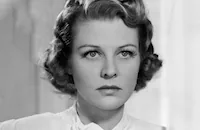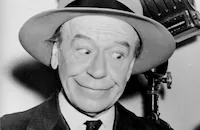Double Wedding

Brief Synopsis
Cast & Crew
Richard Thorpe
William Powell
Myrna Loy
Florence Rice
John Beal
Jessie Ralph
Film Details
Technical Specs

Synopsis
Irene Agnew and her meek fiancé, Waldo Beaver, are learning acting techniques from Bohemian Charlie Lodge, a painter and supposed director with whom they would like to go to Hollywood. Irene's domineering sister Margit doesn't know that she and Waldo have been staying out all night in Charlie's trailer, and is shocked when she finds out. Margit, who spends all of her time attending to business, likes to have everything go according to her own plans and Irene and Waldo's rebellionusness upsets her. She decides to confront Charlie, but becomes frustrated by his unconventional attitudes. Because Irene has lied to her sister and said that she now loves Charlie instead of Waldo, who lacks "yumph," Margit tries to bribe Charlie, whom she is convinced is a phony, to get him out of their lives. She asks her butler Keough, a former policeman and avid amateur detective, to learn everything about him, but in the meantime, agrees to let Charlie paint her, hoping that she can talk him into dropping Irene. In order to do a proper job, Charlie suggest that he and Margit take his trailer to a remote location and spend time alone while he paints her. On their trip, Margit becomes attracted to Charlie's unconventional ways, but fights the feeling and soon drives back to the city. At home, while Margit tells Irene and Waldo that they should be married as soon as possible, Keough tells Margit that Charlie's ex-wife Claire is in town, and Mrs. Kensington-Bly, Margit's financial backer, reveals that Charlie was once her guide in Paris. Charlie visits Mrs. Kensington-Bly and shocks her by inviting her to his wedding in the trailer at three that afternoon to Margit. He then tells Waldo that he is marrying Irene at three. Waldo, who tells Irene that he understands why she prefers a man like Charlie over a man like him, passionately kisses Irene goodbye, then asks Keough for some of Margit's "medicinal" alcohol because he is a very sick man. Meanwhile, Margit visits Claire and learns that she divorced Charlie because her money got in the way of their happiness. She advises Margit not to try and change Charlie and surprises her by saying that Charlie invited her to his wedding that afternoon. As three o'clock approaches, Margit goes to see Charlie, followed by Irene and several of Charlie's pals from the bar across the parking lot. Margit agrees to give Irene her blessing to marry Charlie and soon the Reverend Dr. Blynn arrives to conduct the ceremony. With a band outside waiting to play wedding music, hundreds of spectators are soon attracted and the trailer begins to overflow with visitors. During the ceremony, Irene and Waldo both say "no," when Dr. Blynn asks them if they take each other as husband and wife and Margit and Waldo begin to argue. Soon Waldo, full of yumph as well as liquor, arrives and carries the happy Irene away, leaving Margit finally able to admit to the delighted Charlie that she loves him even though he has turned her world upside down. Overcrowding soon begins to take its toll on the spectators, and a number of fights break out both inside and outside the trailer. Margit and Charlie eventually fall side by side, and just as they are about to get up, the commotion shakes the trailer and causes an Oscar statuette to fall on Margit and Charlie, knocking them unconscious in each other's arms.

Director

Richard Thorpe
Cast

William Powell

Myrna Loy

Florence Rice

John Beal

Jessie Ralph

Edgar Kennedy

Sidney Toler
Mary Gordon
Barnett Parker

Katharine Alexander
Priscilla Lawson
Bert Roach

Donald Meek
Henry Taylor
Irving Lipschultz
Doodles Weaver
Charles Coleman
Billy Dooley

Roger Moore
Oscar O'shea
Josephine Whittell

E. Alyn Warren
Jules Cowles
Jack Baxley
Mitchell Lewis

Gwen Lee
John "skins" Miller
Roger Gray
George Guhl
Jack Dougherty
G. Pat Collins
Crew
Adrian
Herman Fisher
Cedric Gibbons
Robert A. Golden
Sig Kaufman
Joseph L. Mankiewicz
Harold Rosson
Joseph Ruttenberg
Waldo Salt
Douglas Shearer
Frank Sullivan
Jo Swerling
Edward Ward
Edwin B. Willis
Joseph Wright

Videos
Trailer
Hosted Intro
Film Details
Technical Specs

Articles
Double Wedding
Double Wedding marked Myrna Loy's seventh co-starring role with actor William Powell. The two were first paired together in Manhattan Melodrama in 1934 and then went on to huge success as an on-screen duo playing Nick and Nora Charles in The Thin Man series. MGM cast Myrna Loy in Double Wedding partly to ease the sting from the box office disappointment of Loy's previous picture, Parnell (1937), a historical biography often referred to as Clark Gable's worst film. By pairing her with reliable partner William Powell again, the studio hoped to put their popular leading lady back on top.
Sadly, it was during the making of Double Wedding when tragedy struck. Jean Harlow, William Powell's girlfriend of three years and one of Hollywood's biggest stars, died suddenly at the age of 26. Harlow had fallen ill with uremic poisoning brought on by kidney failure while making Saratoga (1937) on a nearby MGM set. Powell and Loy fretted helplessly over the platinum blonde star's health for weeks as she lay deteriorating in the hospital. Harlow's sudden death on June 7, 1937 was a shocking blow to Powell, Loy and all of Hollywood. In her 1987 autobiography Being and Becoming, Myrna Loy remembers that Harlow's death left her and co-star Powell "absolutely devastated" in the midst of making Double Wedding. "Oh, it was horrible, an awful blow," she said. "I loved Jean, deeply."
Following Harlow's death, the cast and crew of Double Wedding tried to carry on filming immediately, but William Powell's grief was too great. He asked for time off to recuperate, and the studio conceded, shutting down the production for several weeks. Eventually production resumed, and the picture was completed close to schedule. However, Myrna Loy felt like she and Powell were not at their best.
Actor John Beal, who plays stuffy Waldo Beaver in the film, was only 27 when he made Double Wedding. Aside from the tragedy with Jean Harlow, he found the production a positive learning experience. "Bill Powell had a technique, an instinct for comedy timing that kept me in awe all throughout the shooting,¿"Beal recounted in a later interview. "He was the consummate professional, never at a loss. I found my own comedy technique sharpening just from playing off him."
The teaming of Loy and Powell proved a smart move for MGM, as the star power alone made Double Wedding a box office success. More slapstick than their usual sophisticated comedies, audiences still couldn't get enough of their favorite on-screen duo. Variety said that the "dialog is snappy and provides plenty of laughs. So long as these two hold the screen there is no letdown in the fun." The pair would co-star in seven more films together, their last one being The Senator Was Indiscreet (1947).
Producer: Joseph L. Mankiewicz
Director: Richard Thorpe
Screenplay: Jo Swerling, based on a play by Ferenc Molnar
Cinematography: William H. Daniels, Harold Rosson
Film Editing: Frank Sullivan
Art Direction: Cedric Gibbons
Music: Edward Ward
Cast: William Powell (Charles Lodge), Myrna Loy (Margit Agnew), Florence Rice (Irene Agnew), John Beal (Waldo Beaver), Jessie Ralph (Mrs. Kensington-Bly), Edgar Kennedy (Spike).
BW-87m. Closed captioning.
By Andrea Passafiume

Double Wedding
Quotes
Trivia
Notes
The working title of the film was Three's Company. According to a news item in Film Daily, Robert Young was at one time cast in the film. He probably was cast in the role that went to John Boles. A Hollywood Reporter news item in mid-July 1937 noted that Robert Benchley was to have a featured role in the picture, but he was not in the released film. Other Film Daily news items noted that portions of the film were shot on location in Santa Barbara at the "winter" estate of C. A. Noble, a "Milwaukee banker and manufacturing tycoon." Additional location work was done in Carmel-By-the Sea by director Richard Thorpe, accompanied by photographer Joseph Ruttenberg and Ruttenberg's assistants, Herman Fisher and Sig Kaufman. According to Hollywood Reporter news item on June 28, 1937, production was partially shut down on Double Wedding following the June 7, 1937 death of M-G-M star Jean Harlow, to whom William Powell was engaged. In the news item, it was announced that Harold Rosson (who was married to Harlow from 1933 to 1934) was replacing William Daniels as the cameraman, however, Rosson's name is also listed on early Hollywood Reporter production charts. Only Daniels' name is credited onscreen and in reviews, and the extent of Rosson's work in the completed film has not been determined. Following the completion of this film, Powell made The Baroness and the Butler, on loan to Twentieth Century-Fox, and did not return to M-G-M until late 1939 when he made Another Thin Man with Myrna Loy. News items from late 1937 through 1938 indicate that grief over Harlow's death and his own surguries, (which modern sources have said were necessary to stop the spread of rectal cancer) forced Powell to refrain from working extensively for almost two years.
















